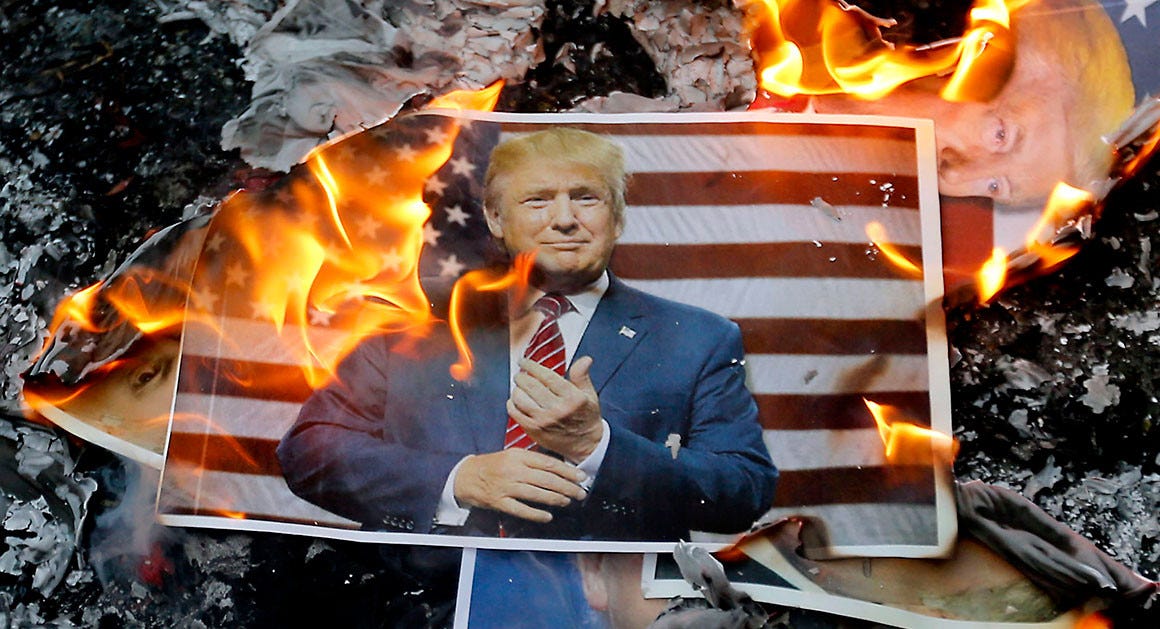The Mar-a-Lago Documents Indictment: A Paradigmatic Trumpian Moment
The indictment tells the story of a crime of pure narcissism and authoritarianism
There is no shortage of excellent commentary on the monumental historical moment of the Justice Department’s indictment of a former president for conduct endangering national security, obstruction of justice, and lying to federal agents. I want to make a couple quick points and refer you to some of the best analysis I have read.
First, the indictment is compelled by the rule of law. David French explains why in the New York Times. Other high ranking government officials and many lowly government employees have been indicted and served time for far less egregious conduct than Trump is accused of with respect to handling of national security information. If the rule of law means anything, it means that the law must be applied consistently to everyone, no matter their rank or status. Trump had to be charged. (I argued earlier this year against indictments of Trump while he was running for office because of their effect on democratic norms, but called for indictments of his co-conspirators and for Trump to be prosecuted after the election).
Second, if the facts in the indictment are proven, there is no doubt that Trump blatantly violated federal law. Three legal experts make this case quite compellingly, also in the Times. First, Trump intentionally transported documents containing highly sensitive national security information from the White House to an insecure private club in Florida. No one should be able to get away with that. Then, when asked on multiple occasions to return the government’s national security information, Trump lied to federal agents, instructed others to lie as well, and obstructed efforts to enforce a valid federal subpoena. Had the former president simply returned the documents, the first set of illegal actions probably would have been excused as an innocent misunderstanding. But the second set of criminal conduct reinforced that the taking of the nation’s secrets was not a misunderstanding at all, but rather intentional criminal actions. This double whammy actually makes this unprecedented indictment a fairly open and shut case.
Third, the prosecution of Trump taking place during a presidential campaign will be a massive and fitting crescendo of the Trumpian era, the outcome of which could shape the future the American democratic republicanism. This bold, but I believe accurate, characterization of the stakes is eloquently laid out by Andrew Sullivan writing in the Weekly Dish. The prosecution will pit against each other the two gravitational forces that are ripping America apart. On one side, the populist anti-establishment movement devoted to Trump and his grievance-based narrative that equates his personal status and well-being with the fate of the nation. On the other, rules-based liberal democracy, that exalts the primacy of democratically enacted law and believes the core American value is the fair and equal application of law to all. A not-guilty jury verdict in a case where Trump has so clearly substituted his own ego over the security interests of the nation could be a stake in the heart of the American constitutional order. A conviction would actuate the deepest fears of the Trumpist wing of the country, an unaccountable deep-state incarcerating the person they believe is the protector of both the country and their very way of life. The next 17 months could truly be a two-round battle for the soul of the nation – first in a Florida courtroom, then in the 2024 presidential election.
Finally, I am struck by how much this episode is quintessentially Trumpian. As the indictment lays out, Trump hoarded the documents that he found most reflective of his awesome presidential powers in his White House residence. For him, they were symbols of his personal greatness, tangible items he could touch and feel (and allegedly show off to others) to bolster his insatiable ego. He could not mentally accept that he lost the election, or that his plan to stop Biden’s ascension to the presidency failed. But at the very least he could hold on to these tactile symbols of his power. When told he could not, first by his aides, then by the National Archives, and then ultimately by the Department of Justice, he did what he has done all his life, ignore societal rules that he, as a narcissist with authoritarian impulses, insists do not apply to him. That he is accused of criminally putting his own personal ego over the interests of the nation is paradigmatic of the Trumpian era in which we are living.




